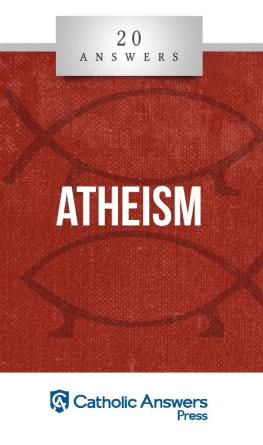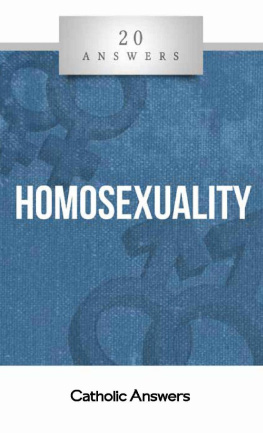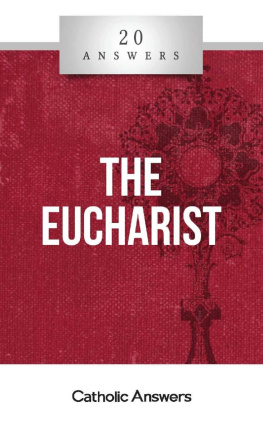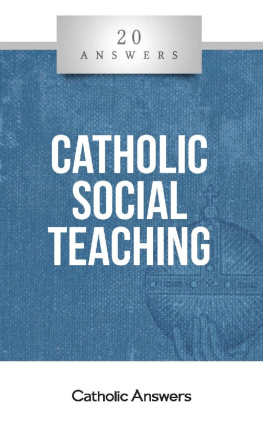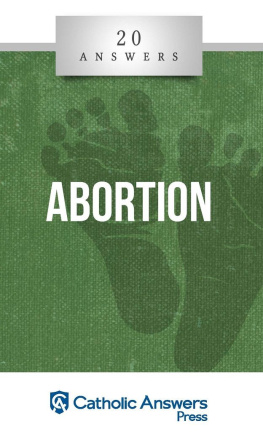Matt Fradd - 20 Answers- Atheism (20 Answers Series from Catholic Answers Book 1)
Here you can read online Matt Fradd - 20 Answers- Atheism (20 Answers Series from Catholic Answers Book 1) full text of the book (entire story) in english for free. Download pdf and epub, get meaning, cover and reviews about this ebook. year: 2016, publisher: Catholic Answers Press, genre: Religion. Description of the work, (preface) as well as reviews are available. Best literature library LitArk.com created for fans of good reading and offers a wide selection of genres:
Romance novel
Science fiction
Adventure
Detective
Science
History
Home and family
Prose
Art
Politics
Computer
Non-fiction
Religion
Business
Children
Humor
Choose a favorite category and find really read worthwhile books. Enjoy immersion in the world of imagination, feel the emotions of the characters or learn something new for yourself, make an fascinating discovery.
- Book:20 Answers- Atheism (20 Answers Series from Catholic Answers Book 1)
- Author:
- Publisher:Catholic Answers Press
- Genre:
- Year:2016
- Rating:3 / 5
- Favourites:Add to favourites
- Your mark:
- 60
- 1
- 2
- 3
- 4
- 5
20 Answers- Atheism (20 Answers Series from Catholic Answers Book 1): summary, description and annotation
We offer to read an annotation, description, summary or preface (depends on what the author of the book "20 Answers- Atheism (20 Answers Series from Catholic Answers Book 1)" wrote himself). If you haven't found the necessary information about the book — write in the comments, we will try to find it.
Matt Fradd: author's other books
Who wrote 20 Answers- Atheism (20 Answers Series from Catholic Answers Book 1)? Find out the surname, the name of the author of the book and a list of all author's works by series.
20 Answers- Atheism (20 Answers Series from Catholic Answers Book 1) — read online for free the complete book (whole text) full work
Below is the text of the book, divided by pages. System saving the place of the last page read, allows you to conveniently read the book "20 Answers- Atheism (20 Answers Series from Catholic Answers Book 1)" online for free, without having to search again every time where you left off. Put a bookmark, and you can go to the page where you finished reading at any time.
Font size:
Interval:
Bookmark:
20 Answers
Atheism
Matt Fradd
20 Answers Atheism
Matt Fradd
2014 Catholic Answers
All rights reserved. Except for quotations, no part of this book may be reproduced or transmitted in any form or by any means, electronic or mechanical, including photocopying, recording, uploading to the Internet, or by any information storage and retrieval system, without written permission from the publisher.
Published by Catholic Answers, Inc.
2020 Gillespie Way
El Cajon, California 92020
1-888-291-8000 orders
619-387-0042 fax
catholic.com
Printed in the United States of America
ISBN 978-1-938983-52-8 paperback
ISBN 978-1-938983-53-5 Kindle
ISBN 978-1-938983-54-2 ePub
TOTUS TUUS MARIA
A short and simple book deserves a short and simple blurb. I am happy to supply it for Matt Fradds useful little book, 20 Answers: Atheism . It is practical, to the point, and on target. Above all, its TRUE. Peter Kreeft, Professor of Philosophy, Boston College
Table of Contents
Introduction
A few years ago, in England, there were brightly colored ads on the sides of buses, sponsored by atheist groups, that read, Theres probably no God. Now stop worrying and enjoy your life.
Well, we could try. But it might not be that easy. For no question is more important than Does God exist?
If God does not exist, then we must admithowever unpleasant the thought may bethat there is ultimately nothing special about the world and the beings that inhabit it. Mankind is merely the product of a random and senseless cosmic process: the result of time plus matter plus chance. As one atheist put it, were all just bags of chemical reactions walking around. We can pretend that there is meaning to life, but this amounts to nothing more than self-delusion. In the end, nothing matters.
As the famous atheist author Bertrand Russell remarked:
All the labors of the ages, all the devotion, all the inspiration, all the noonday brightness of human genius, are destined to extinction in the vast death of the solar system, and that the whole temple of Mans achievement must inevitably be buried beneath the debris of a universe in ruinsall these things, if not quite beyond dispute, are yet so nearly certain, that no philosophy which rejects them can hope to stand.That bus ad is just one example of a recent surge of anti-evangelism by a new and aggressive form of unbelief. The zeal of the so-called new atheistssuch as Richard Dawkins and the late Christopher Hitchensis enough to put even the most enthusiastic televangelist to shame.
I have a lot of sympathy for people who dont believe in God. I used to be in that position myself, and for a long time no one gave me good answers to the questions and concerns I had. But I have since discovered that there are good answersthat there are good arguments for Gods existence.
In the pages that follow, we will look at twenty common questions and objections that atheists posethat I used to poseand offer solid theistic answers. Whether you are an atheist, an agnostic, or a believer, its my sincere hope that this booklet will help you as you study the issue of Gods existence.
After all, there is no bigger question.
1. Atheism is not a positive proposition, so it does not have to be proven. The burden of proof is always on the theist.
Theism, which is derived from the Greek word for God, theos , is the view that God exists. Atheism, in contrast, is the view that God does not exist. That means atheism is a claim to knowledgenot merely a suspension of belief. In other words, an atheist is a person who rejects the existence of God, not a person who isnt sure if God exists or who is waiting to see more proof. We already have a perfectly good word in the English language for a person who withholds belief in God: agnostic.
Some atheists want to redefine atheism as something more like agnosticism, so they wont have to prove their position. This eagerness to redefine atheism all but admits the weakness of arguments against Gods existence. If atheists thought these arguments were compelling, they would spend less time on redefining words instead.
The person who is trying to convince someone else of his position must always shoulder the burden of proof. If I want to convince someone to abandon the belief that there is no good evidence for God and come to believe that theism is true, then I bear the burden of proof. But this applies to atheists as well. If they want to convince me to abandon my belief that there is good evidence for God and come to believe that atheism is true, then they must offer proof. The rejection of God is as much a claim to knowledge as belief in God.
2. I cant prove atheism because it is impossible to prove a negative. To do that, I would have to know every single thing in reality and demonstrate that none of these things is God. Thats humanly impossible.
Its entirely possible to prove a negative. People do it all the time.
For example, you can prove that there are no square circles, or that there are no lions in the room with you right now, or that there are no flaming snowflakes (as awesome or terrifying as that might be).
In fact, the claim There are no negative propositions that can be proved is itself a negative proposition! So any argument in favor of it cant work, because that would undermine the claim its attempting to prove.
You dont have to scan everything in the universe to determine that there is no God to be found. If the idea of God is nonsensical, as atheists often claim, then you could demonstrate it logically the same way that you can demonstrate that there are no square circles. A mathematician doesnt have to search every inch of the universe to make sure there arent any square circles hiding in it. Geometry tells him there arent.
On the other hand, if the idea of God isnt nonsensical, then the atheist must provide evidence to show why a believer should conclude that God doesnt exist. He must also refute the arguments that seek to prove God does exist. The traditional arguments for Gods existence dont amount to You cant prove there is not a God; therefore there must be a God! Rather, they offer positive reasons for believing in God as the universes creator, designer, moral lawgiver, first cause, and so forth.
3. Christians sometimes argue that God is the basis of morality. But cant an atheist be just as good a person as a believer?
A person can certainly follow personal or social codes of morality even if he doesnt believe in God. However, without God there would be no foundation for objective moralitythat is a reason to explain why some actions just are right or wrong regardless of what some people may think or do.
Many atheists actually agree on this point. The French atheist philosopher Jean-Paul Sartre said that its extremely embarrassing that God does not exist, for there disappears all possibility of finding values in an intelligible heaven.But other atheists disagree with this, usually in one of two ways. First, they may claim that there are no objective truths and that morality is simply relative. They dont believe that even great evils like the Holocaust are objectively wrongjust that they are wrong from their own point of view. But if you believe that the Holocaust or other evils such as torture or rape just are wrong, no matter what anyone thinks, then this solution wont work for you. The second option for an atheist is to argue that objective morality does exist but is not grounded in God (well examine that argument in a little bit).
Other atheists vacillate, acknowledging that their worldview makes no room for objective morality but then turning around and speaking as if right and wrong were real. For example, celebrity atheist Richard Dawkins writes, The universe that we observe has precisely the properties we should expect if there is, at bottom, no design, no purpose, no evil, no good, nothing but pitiless indifference.So which is it? Does evil exist or not?
Next pageFont size:
Interval:
Bookmark:
Similar books «20 Answers- Atheism (20 Answers Series from Catholic Answers Book 1)»
Look at similar books to 20 Answers- Atheism (20 Answers Series from Catholic Answers Book 1). We have selected literature similar in name and meaning in the hope of providing readers with more options to find new, interesting, not yet read works.
Discussion, reviews of the book 20 Answers- Atheism (20 Answers Series from Catholic Answers Book 1) and just readers' own opinions. Leave your comments, write what you think about the work, its meaning or the main characters. Specify what exactly you liked and what you didn't like, and why you think so.

